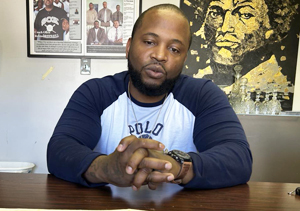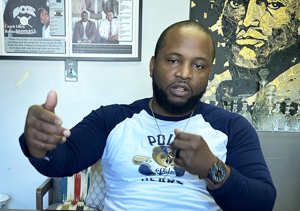 By Fletcher Word
By Fletcher Word
The Truth Editor
Antoine Rayford’s journey from teen drug dealer and school dropout to community activist has been an improbable but not impossible journey. It’s a journey that he is dedicated to helping others make – to render it more possible for others.
Rayford, who returned to Toledo about two years ago after being away for almost two decades, is now an HVAC instructor with TTEC and a board member of Peace & Healing, a non-profit organization founded in 2021 in order “to address gun violence and the deaths” of kids in the city of Toledo, said Peace & Healing co-founder Thomas Douglas.
Peace & Healing is in the process of transforming Toledo Spain Plaza into a meeting and activity spot for families who are recovering from such losses.
Rayford is also the founder of Tighten Up 419, a non-profit mentoring group that is being sponsored by both Peace & Healing and Phillips Ministries (formerly Grace Temple). The purpose of Tighten Up 419 is “mentoring to build up a brotherhood,” says Rayford. “The goal is to take my generation to mentor teens and early 20s in a 13-to-16-week period – and make it personal be mentoring brothers, neighbors.”
The mentors of Tighten Up 419 will be seeking to bring at-risk boys and young men into the fold.
Rayford knows something about at-risk youth. His own youth was more than just “at-risk;” it was risk itself. From the age of 13, he was living his life on the streets, drinking, taking drugs and, ultimately, selling drugs. He had dropped out of school after the eighth grade, barely able to read and write.
However, he was a natural leader, he says now, and he managed to get his brothers, uncles and friends involved with the group he co-founded – the Bee Hive Gang – affiliated with the Crips. He spent four years on the streets, leading his gang in criminal activities and rarely being influenced by positive messages or messengers.
“We never had a positive male figure around us, everything around us was always negative,” he says now of the influences he and his three brothers faced as they grew during their adolescent years.
After four years in the streets, he did begin to have doubts about his choices but he also was hooked on the lifestyle and his ability to influence his friends.
“I was doing what I thought I had to do – helping my friends,” he recalls. However, he was also, as the years went on, questioning his choices. “I started thinking, is this it?” He began to daydream: “is this what we are going to do all day.”
 On February 1, 2004, everything collapsed for Rayford, his two friends and the customer they ended up shooting to death.
On February 1, 2004, everything collapsed for Rayford, his two friends and the customer they ended up shooting to death.
“I talked my friends into running the guy who’d been buying drugs, I had a gun on me; through the loyalty and love we were raised on, I convinced them. I was a coward in that moment. I didn’t have the courage to say I’m just playing.”
Rayford handed the weapon to his friends, the trio assaulted the customer, the weapon was drawn and when the customer lunged at them, it was fired accidentally, twice, killing the buyer.
Days later, Rayford was sitting alone, full of despair and remorse in the juvenile detention center. “I felt condemned, like I was going to hell.” Fate had other plans for him. “A sheriff’s deputy, an older white lady, came into my cell and said, ‘can I pray for you,’ it was like she was an angel.”
She cried and prayed with Rayford, held him and told him, “if you want to believe in God, believe in God.” She sparked a flame in the 17-year-old youngster. “I made a promise to God, I felt healed and made a vow to him, ‘no more drugs, no more selling drugs; from that point forward, I wanted to better myself.”
Rayford did pay a price for the violence he had unleashed. He spent the next 14 years incarcerated in various Ohio penal institutions, on a manslaughter charge. But he spent his time wisely. He learned to read and write, obtained his GED and took various college courses. He took HVAC courses along with general maintenance, along with Toastmaster (public speaking) classes.
As the years passed in prison, he also mentored younger inmates, participating in established programs but also helping to organize a program at North Central Correctional that had the direct impact of reducing prisoner-on-prisoner confrontations. The “Christian Rap” gang intervention program brought in “lots of guys causing problems on the compound” and helped curb violence in what was once the most violent prison in Ohio, he says.
Upon his release, Rayford settled in Columbus, married a childhood friend from Toledo, became a father – twice over – and eventually relocated to his home town. And, true to the vow he made two days after he was arrested in early 2004, he has not given in to the temptations of his teen years. He has been active in helping others avoid or leave a life in the streets, in helping other avoid the mistakes of his own youth.
He has also been blessed by the positive influences he has found since, such as Stephanie Boutte of Ternion Training and Education Center (TTEC). “A blessing and a positive impact on the community,” he says of Boutte.
All these positive influences in his hometown – Peace & Healing, Phillips Ministries, TTEC – have helped Rayford continue the promise he made to God and maintain the drive he found while imprisoned to help others, to bring a change to a community, to build a brotherhood, to ensure that the lure of the streets does not negatively impact hundreds and thousands more area youngsters.
